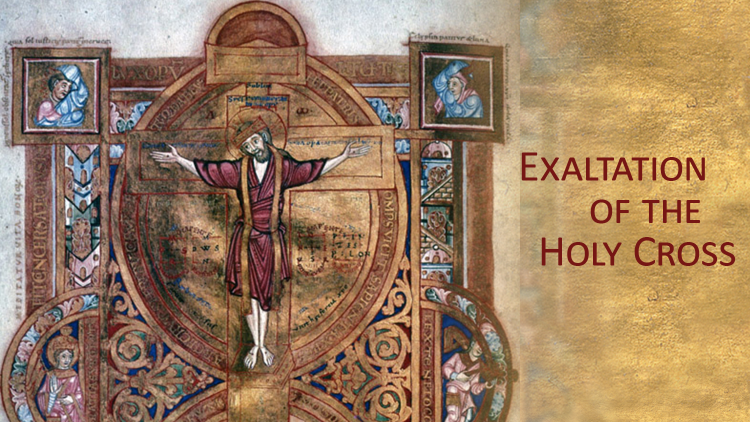
Feast of the Exaltation of the Holy Cross
On 13 September 335, the Church of the Holy Sepulcher (also called the Church of the Resurrection) was dedicated. The following day, the cross that Empress Helena had discovered on 14 September 320, was venerated in a solemn ceremony. In 614, the Persian King, Chosroes II, waged war on the Romans. After conquering Jerusalem, he confiscated many treasures, among which was the Cross of Jesus. The Byzantine emperor Heraclius initiated peace negotiations, but was rejected. He then waged war and won near Nineveh, asking for the restitution of the Cross, which then returned to Jerusalem. Today, the cruelty of the Cross is not what is exalted, but the Love that God manifested to humanity by accepting death on the Cross: “Who, though in the form of God, emptied himself, taking the form of a slave. This is the glory of the Cross of Jesus!” (Pope Francis)
Jesus said to Nicodemus: ‘No one has gone up to heaven except the one who has come down from heaven, the Son of Man. And just as Moses lifted up the serpent in the desert, so must the Son of Man be lifted up, so that everyone who believes in him may have eternal life.’ For God so loved the world that he gave his only Son, so that everyone who believes in him might not perish but might have eternal life. For God did not send his Son into the world to condemn the world, but that the world might be saved through him (Jn 3:13-17).
Stop turning in on ourselves
“Being Christian”, Pope Benedict XVI wrote, “is not the result of an ethical choice or a lofty idea, but the encounter with an event”. The Gospel the liturgy offers us on the Feast of the Exaltation of the Holy Cross suggests that God wants to enter into a relationship of love with everyone. This is offered in His Son, Jesus, lifted up on the Cross.
Lifting up our gaze to God expresses a very important truth: we are invited to enter back into relationship with Him. We need to stop turning in on ourselves, uselessly nurturing a sense of guilt and forgetting that “in whatever our hearts condemn, God is greater than our hearts” (1 Jn 3:20). Let us lift up our eyes toward the stars (remember Abraham and the promise of many descendants), knowing how to cast every worry onto God.
Wonder and gratitude
Lifting up our gaze should not enkindle fear, but gratitude, because that elevation is the measure of the love with which God loves His children, in His Son. It is the Mercy of God, therefore, which, as is the case with Nicodemus, illuminates the darkness of our lives and allows us to continue on our journey.
There is no neutrality regarding the Cross
We cannot remain neutral regarding the Cross of Jesus. Either we are with Him or we are against Him. A choice is made before every action, for the actions of a Christian are none other than the testimony of how “God has love us so much that he gave His only Son, Jesus”.
Prayers
Most High glorious God,
enlighten the darkness of my heart.
Grant me an upright faith,
secure hope and perfect charity.
Fill me with understanding and knowledge
that I may fulfill your command. Amen.
(prayer of Saint Francis before the Crucifix of San Damiano)
We adore you,
Lord Jesus Christ,
here, and in all your churches
throughout the whole world,
and we bless you,
for by your holy cross you
have redeemed the world.
(Saint Francis of Assisi)








